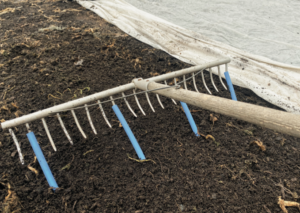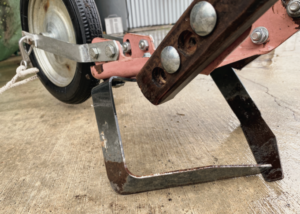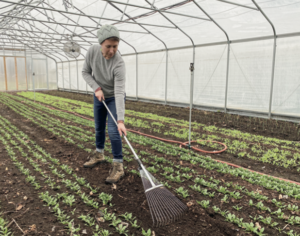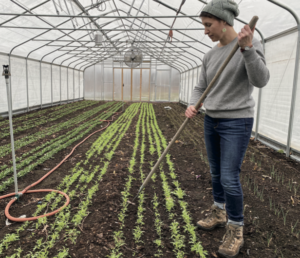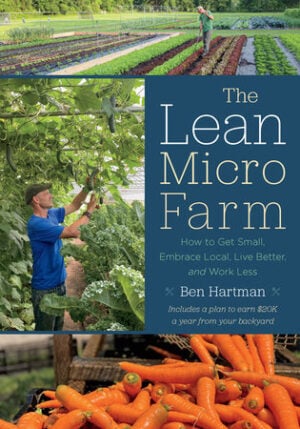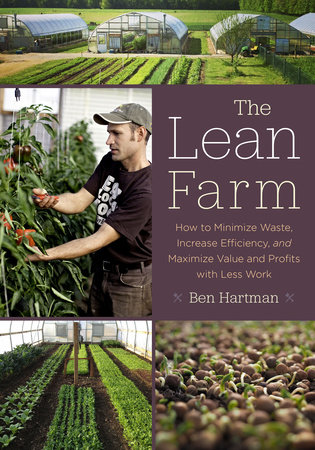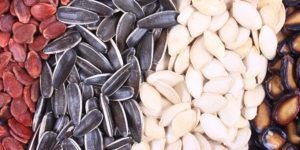Starter Kit Tools: 9 Vital Tools for Micro-Farming
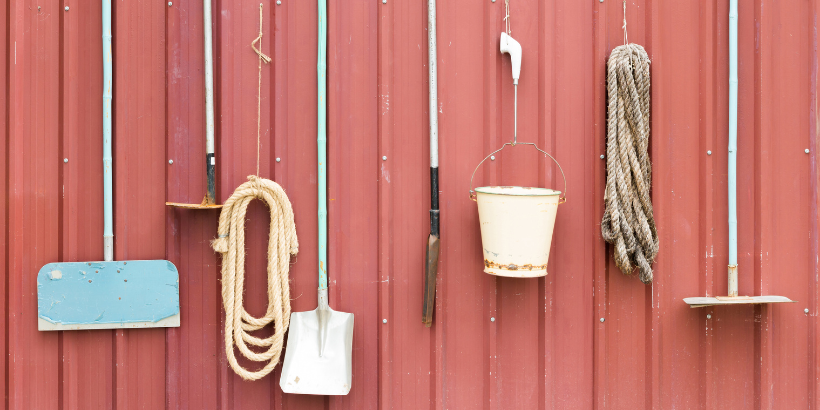
Interested in micro-farming, but don’t know where to begin? Believe it or not, you only need 9 tools to get started. These easy-to-find tools for micro-farming will set the stage for productive growing!
The following is an excerpt from The Lean Micro Farm by Ben Hartman. It has been adapted for the web.
Unless otherwise noted, all photographs and illustrations copyright © 2023 by Clay Bottom Farm.
Tools for Micro-Farming: Starter Kit Tools
These are basic tools that I recommend for micro farming. They add a lot of value at a relatively low cost. They are all you really need to get started.
In fact, I also recommend this starter kit for home gardeners, except for the wheel hoe. If you have a very tiny plot, a wheel hoe might be unwieldy.
Vital Field Tools for Micro-Farming
We accomplish most of our work with just seven field tools. In order of how frequently we use them, here are the field tools I kept throwing into the back of the van along with a word about how to use them.
1. 30″ Bed Preparation Rake
This rake is distinguishable from a standard garden rake because the angle of its tines can be adjusted to effectively “skim” beds of debris while standing in a comfortable upright position and because it is lighter in weight.
Its tines can glide collinearly with the soil surface, making it an ideal tool for no-till bed preparation. A standard rake would dig too deeply. It also features a longer handle than most rakes.
We use this tool almost daily to clear beds of debris and to level them before planting. The rake is available at Johnny’s Selected Seeds, and a heavier-duty version is sold through Earth Tools.
Johnny’s also sells row markers, tubes that can be placed over selected tines to aid in marking rows. Or you can cut your own tubes from scrap 1/2″ PEX plumbing pipes.
2. Fixed-Blade Sweeps on a Wheel Hoe
The fixed-blade sweeps from Hoss Tools can be adjusted to fit on many types of wheel hoes. Our wheel hoe is from Glaser.
The blades are sturdy and “fixed,” meaning they don’t swivel like an oscillating hoe. Power from your upper body is transferred directly to the soil.
We use the sweeps to cultivate pathways, and we rely on them to loosen compacted ground, a job typically reserved for broadforks. We’ve found the sweeps to be more ergonomic and faster to use than broadforks. We also use this tool to slice underneath roots to loosen them.
3. Aluminum Scoop Shovel
The lowly scoop shovel earned its coveted spot on our tool list because it’s multifunctional. We spread compost with it and use it to grade
pathways. Scoop shovels are available in a variety of widths, and I recommend buying one whose front edge matches the width of your paths between growing beds.
4. Adjustable-Width Rake
This low-cost rake features tines that can be adjusted between 6″ and 24″ wide. We bought ours at a local hardware store.
We use it to clean pathways, rake debris from growing beds, and for general yard cleanup.
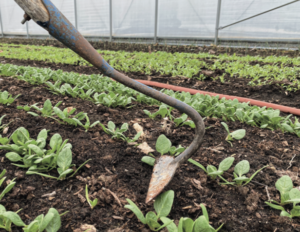
If you own just one hoe, I recommend the half moon hoe because it is ergonomic to use, durable, and can reach weeds in tight spaces.
5. Half Moon Hoe
This classic European tool is both powerful and precise. Its sturdy gooseneck is strong enough to allow for deep digging, and its fine points scuttle with finesse underneath and between plants.
In other words, it is one hoe that performs the work of many, perfect for a minimalist. We have tried dozens of hoes, and this is still the best all-around hoe, in our experience.
Its head is 6 1/2″ wide. Our half moon hoe is made by DeWit.
6. Narrow Collinear Hoe
The Johnny’s Selected Seeds narrow collinear hoe, designed by Eliot Coleman, outperforms other small hoes that we have used.
With a 33/4″-wide head, it is just the tool to cultivate between greens seeded closely together.
It glides on the surface, collinearly, instead of digging into the ground. This makes it much easier to use than standard hoes.
7. Garden Fork
Our Clarington Forge garden fork is the most durable digging fork we have used. It is perfect for loosening carrots and potatoes, dislodging stubborn weeds, or moving straw.
We broke many cheaper digging forks before splurging on this one, which should last a lifetime.
The fork is made from one piece of steel that extends far up the handle, past the point where our previous forks always broke.
Vital Tools for Micro-Farming: Harvesting Tools
When we moved, we trimmed an array of harvesting tools down to two.
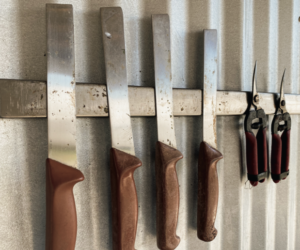
Knives and pruners for hand harvesting are stored on magnetic bars near the entrances to our processing room and greenhouses.
1. Curved Grape Shears
The curved tip on this tool gives it an edge, so to speak—it allows you to harvest without twisting your wrist awkwardly around fruit clusters to reach to the stems. This seems like a minor point, but after harvesting 500 pounds of tomatoes, your wrist will appreciate that little curve.
That said, many types of pruners can work to harvest tomatoes, peppers, and the like, and I think the best pair of shears is one that fits comfortably in your hand.
2. A 6″ Stainless Steel Restaurant-Grade Produce Knife
We use this knife, designed for use in restaurants, to harvest baby greens.
We own several, and we hang them on magnets attached to our green- house and outside the door to our processing room, where they are quick to grab. The square edge on the knife makes it safe to handle.
Also, the tool sanitizes easily because of its simple shape. It is widely available through online restaurant retailers.
Recommended Reads
Recent Articles
Think you need a vast outdoor garden in order to enjoy fresh produce? Think again! Cold temperatures doesn’t have to mean the end of fresh greens!
Read MoreStoring seeds is the key to having a successful growing season. Follow these tips for keeping seeds organized so you’re ready to plant as soon as the time is right!
Read MoreThese hardy little berries are great to grow if you live in a colder climate. A versatile evergreen ground cover that bring both ornamental beauty and productive harvests to acidic-soil gardens.
Read MoreGet ready to snuggle up with the softest wool in town! When it comes to rabbits, the Angora is the most commonly used breed for wool. It is exceptionally fine and renowned for its softness, warmth, and fluffiness!
Read MoreReady to start your silvopasture journey? First things first: which animals are right for YOUR land?
Read More

